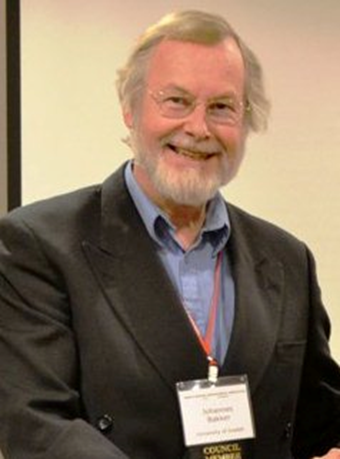Pracoviště Historické sociologie FHS UK Vás srdečně zve na přednášky, které ve spolupráci s pracovištěm přednese prof. J. I. (Hans) Bakker z Guelphské univerzity v Kanadě.
Pobyt prof. Hanse Bakkera na FHS UK se uskutečňuje s podporou programu PROGRES Q20 „Kultura a společnost."
 Prof. J.I. (Hans) Bakker taught Sociology and Anthropology at four different universities early in his career but became a Full Professor at the University of Guelph, in Guelph, Ontario, Canada. His work has focused on Comparative Historical Sociology with an empirical emphasis on Indic Civilization. He has written about Gandhi and about colonialism in the Indonesian archipelago before independence. He has also done consulting work for the Canadian International Development Agency (CIDA) in Sulawesi, Indonesia, some of which involved studying the Bajo (Bajau, Sea Nomad) people. His recent edited books are entitled: The Methodology of Political Economy: Studying the Global Rural-Urban Matrix (Lexington, 2015) and Rural Sociologists at Work: Candid Accounts of Theory, Method, and Practice (Routledge, 2016). He guest edited a special issue of the journal Sociological Focus on Grounded Theory (2019). In addition to his academic activities he is also very interested in religious institutions and spiritual paths, having studied Tibetan Buddhism and the history of Judaism and Christianity in depth. His philosophical orientation is based on the work of Wilhelm Dilthey and his sociological theory is Neo-Weberian but also includes aspects of Neo-Marxian World Systems Theory (WST) (e.g. Wallerstein).
Prof. J.I. (Hans) Bakker taught Sociology and Anthropology at four different universities early in his career but became a Full Professor at the University of Guelph, in Guelph, Ontario, Canada. His work has focused on Comparative Historical Sociology with an empirical emphasis on Indic Civilization. He has written about Gandhi and about colonialism in the Indonesian archipelago before independence. He has also done consulting work for the Canadian International Development Agency (CIDA) in Sulawesi, Indonesia, some of which involved studying the Bajo (Bajau, Sea Nomad) people. His recent edited books are entitled: The Methodology of Political Economy: Studying the Global Rural-Urban Matrix (Lexington, 2015) and Rural Sociologists at Work: Candid Accounts of Theory, Method, and Practice (Routledge, 2016). He guest edited a special issue of the journal Sociological Focus on Grounded Theory (2019). In addition to his academic activities he is also very interested in religious institutions and spiritual paths, having studied Tibetan Buddhism and the history of Judaism and Christianity in depth. His philosophical orientation is based on the work of Wilhelm Dilthey and his sociological theory is Neo-Weberian but also includes aspects of Neo-Marxian World Systems Theory (WST) (e.g. Wallerstein).
Website: http://jihansbakker.com/
It is well known that Max Weber (1864-1920) advocated the use of what he called "ideal types". But, unfortunately, many people do not pause to consider what that really means. It is even true that sometimes the use of ideal types is simply considered a research technique. But it is an epistemological position. Weber was well aware of the struggle concerning Methodologies (Methodenstreit). The binary between the idiographic and the nomothetic was not adequate, he felt, since there is something in between those two "pure types" and that is the ideal type epistemological approach. A truly idiographic epistemology would require "thick description" in the strict sense of careful description of one time (t-1) and one place (p-1). A truly nomothetic set of true "laws" would require generalizations that are "universal" for all relevant times (t-u) and spaces (s-u) in the "universe" that is being discussed. An ideal type, in turn, is relevant for a SET of times and places (t-n, p-n). What I myself add to this is the notion that an Ideal Type Model (ITM) is a set of Ideal Types (ITM= IT-1, IT-2, IT-3, IT-4 .... IT-n). I exemplify that in the analysis of traditional bureaucracies versus modern bureaucracies.
Přednáška se uskuteční v rámci kurzu „Milestones of European historical development in historical and sociological context“ HISO FHS UK v pondělí 7. října 2019, 8.00-9.20, místnost AKVA (přizemní místnost vedle prezenční studovny knihovny T.G. Masaryka, areál FHS UK v Jinonicích, U Kříže 8, Praha 5 Jinonice).
The Republic of Indonesia as it exists today is a secular nation-state. It is not a "white" country in the same sense as many of the so-called former "white settler colonies" (WSCs). Australia or Canada are WSCs even though of course there are many "aboriginal" or indigenous people in these countries. But the Republic of Indonesia has no specifically "white" European population. Instead, there are hundreds (N = 400+ ) of ethnic groups and even more languages ( N = 900+). So why did the archipelago of 7,400 islands not become a WST when it is claimed the "Dutch" were there since at least 1815? The basic answer is that the Netherlands East Indies actively discouraged settlement by people from Europe. Many Europeans came, but almost all of them were forced to leave. However, even if they had to leave (often at age 55) many ALSO left children. Those offspring eventually blended into the so-called Indo-European population and are now fully Indonesian citizens. The situation in Indonesia is very different from the United States of America where the "one drop rule" applies even today. Indonesia is an interesting case and there are few examples elsewhere. In Vietnam, for example, the French colonial policy encouraged the notion that all people in their colonies were to become really French.
Přednáška se uskuteční v rámci pravidelného přednáškového kurzu Historicko-sociologické konfrontace HISO FHS UK v úterý 8. října 2019, 17.00-19.00, 2080 (Budova A, areál FHS UK v Jinonicích, U Kříže 8, Praha 5 Jinonice).
Univerzita Karlova
Fakulta humanitních studií
Studijní program Historická sociologie
Pátkova 2137/5
182 00 Praha 8 - Libeň
(kancelář 2.06)
garant studijního programu
tajemnice